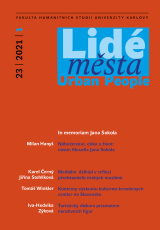Mediální džihád v reflexi představitelů českých muslimů
Meze odsuzování islámského terorismu a (de)privatizace náboženství v České republice
DOI:
https://doi.org/10.14712/12128112.2360Klíčová slova:
Muslims, Muslim leadership, jihad, denouncing terrorism, media coverage, de-privatization of religion, setting the agendaAbstrakt
This paper focuses on two intertwined research questions, namely, what is the perception of the Czech media coverage of jihad among the Czech Muslim leaders, and what is their perception of the public and media demand for their condemnation of the terrorist attacks perpetrated abroad in the name of Islam and jihad? The paper aims to discuss the research findings in the broader context of the risk of the possible future social exclusion of the as yet well integrated Czech Muslims, as well as in the context of the revised theory of the de-privatization of religion. The qualitative research is based on structured interviews with those Czech Muslim leaders who are close to the organizational cores of Islamic institutions in the Czech Republic. It is analysed using open coding. The Czech media coverage of jihad is seen as demonising the Islamic concept, stereotypically depicting Muslims as aggressors rather than victims, suggesting that although not all Muslims are terrorists, all terrorists are Muslims, decontextualizing the coverage of terrorism, releasing news coverage suggesting the connection between Muslims and v iolence w ithout prior due v erification, and u sing the adjective Islamic as an implicit means of explaining the root causes of the attacks. Informants also claimed that the selective media coverage of the jihadist causes and its extreme interpretations of Islam promote the recruitment of new terrorists and terrorism. There was a consensus among the informants in terms of the critical reflection of the media coverage of the concept of jihad, however not so much for the reasons as for the fact. At the same time, is seems plausible to claim that the Czech Muslims’ distrust of the media is one of the factors leading to a very ambivalent stance on the matter whether they should or should not issue public statements condemning terrorist attacks in the name of jihad. Other factors that lead to this ambivalence include the criticism of Western foreign and military policy leading to the rise of terrorism and the consequent victimising of the West, the alleged double standards of the media and public applied to that policy and to the acts of the so-called Islamic terrorism, the scepticism whether the public condemning of violence in the name of jihad can in fact stop future terrorists, and finally, the feeling that there is no connection between the given Czech Muslim and the terrorists attacks abroad, and thus, they personally carry no responsibility for those attacks and in turn, there is no need to publicly distance themselves from them or even to be publicly sorry for them. The whole media and public discourse on so-called Islamic terrorism can be seen as part of the specific pattern of the de-privatization of religion in the Czech Republic, where Islam was nationalised by nonbelievers, put to the fore of the public sphere, and rose to the top of the media, political, and public agendas. The concept of the privatization of religion is thus problematized in this respect.
Stahování
Publikováno
Jak citovat
Číslo
Sekce
Licence
Copyright (c) 2022 Karel Černý, Jiřina Stehlíková

Tato práce je licencována pod Mezinárodní licencí Creative Commons Attribution 4.0 .


